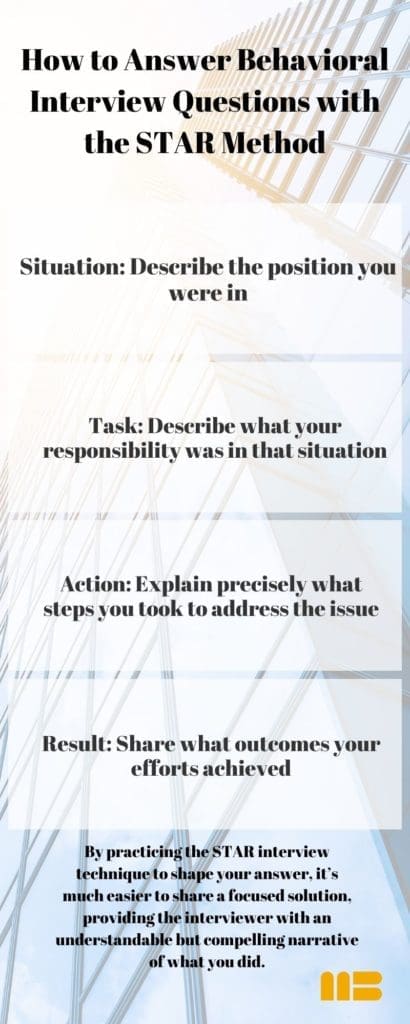If you are preparing for a management position, there’s a high probability you’ll be asked behavioral interview questions.
At MatchBuilt, we’ve placed 1000s of candidates we’ve found that over 90% of our hiring clients use these situational inquiries as a key tool in evaluating potential leaders. It’s not just about recounting experiences; it’s about demonstrating alignment with the organization’s values and vision.
Our guide, rooted in expert HR knowledge, introduces the STAR method—a practical strategy for structuring your responses to align perfectly with potential employers’ expectations.
Filled with real-world scenarios and tailored answers, this guide empowers you to demonstrate your leadership skills effectively. Whether you’re a seasoned manager or aspiring for your first leadership role, our guide is your roadmap to interview success.
Introduction to Behavioral Interview Questions for Management
Navigating management interviews requires a deep understanding of behavioral interview questions. These aren’t just queries about your skills; they’re a window into how you lead, solve problems, and handle workplace dynamics. As a potential manager, your responses to these questions are critical in showcasing your leadership qualities and decision-making abilities.
The Significance of Behavioral Questions in Management Interviews
Behavioral questions are crucial in management interviews because:
- Leadership Insight: They reveal your capacity to lead and inspire teams.
- Problem-Solving Skills: They assess how you approach and resolve challenges.
- Team Dynamics: They highlight your ability to work with diverse personalities and manage conflicts.
- Adaptability: They show how you respond to change and evolving business needs.
- Decision-Making: They evaluate your ability to make sound decisions, especially under pressure.
- Emotional Intelligence: They probe into how you manage emotions, both yours and your team’s.
- Growth Potential: They indicate your ambition and readiness for bigger roles.
In essence, these questions are about more than your past; they’re about how well you fit into a leadership role. Your answers should reflect not just experience, but also your potential to guide a team towards success.
For a more in-depth understanding of how to answer behavioral interview questions specifically tailored for management positions, watch this insightful video.
Mastering the STAR Method in Interviews
Ace your management interviews with the STAR method, a structured approach for answering behavioral questions. It helps you present your experiences clearly and effectively.
Understanding the STAR Technique
The STAR method breaks down your response into four parts: Situation, Task, Action, Result.
Situation
Set the scene briefly. Describe the context of your challenge or project. This helps the interviewer understand the background of your story.
Task
Explain your specific role and objectives. What were you responsible for in this scenario? This sets the stage for your actions.
Action
Detail the steps you took. Focus on how you approached the task and the skills you used. Be precise to show your problem-solving and leadership abilities.
Result
End with the outcome. What did you achieve? Highlight the impact of your actions and what you learned.
Quick Tips for Preparation
- Reflect on various scenarios from your career.
- Choose examples that show key skills and achievements relevant to the role.
- Practice crafting concise, structured responses using the STAR method.
Remember, the STAR method is more than recounting events; it’s about showcasing your skills and fit for the role in a clear and engaging way.
To see the STAR method in action with real-life examples, check out this video.
Comprehensive Guide to Management Behavioral Interview Questions
In management interviews, behavioral questions are grouped into key categories, each designed to assess vital managerial skills. Let’s explore these categories and some example questions to prepare effectively.
Adaptability Questions
Adaptability is crucial in management. Interviewers assess your ability to adjust to changes and handle uncertain situations.
Examples of Adaptability Questions
- Describe a time when you adapted to significant changes at work.
- Tell me about a new approach you had to embrace in your job.
- How have you convinced others to accept a necessary change?
- Describe handling a high-pressure situation and your coping strategy.
- Share an experience where you learned from failure.
- Discuss your first job and how you adjusted to the professional environment.
- Give an example of quick thinking in a tough spot.
Communication Questions
Effective communication is a staple in management roles, dealing with teams, clients, and stakeholders.
Examples of Communication Questions
- Describe how you conveyed complex information in a meeting.
- How do you handle negative feedback?
- Share an instance where you persuaded someone at work.
- Explain how you dealt with unclear instructions from a superior.
- Describe dealing with a difficult coworker or customer and the steps you took.
- How do you handle disagreements within your team?
- Share a successful presentation and what made it effective.
Teamwork Questions
Teamwork skills are essential to ensure collaborative and efficient team performance.
Examples of Teamwork Questions
- Share a challenge you faced while working in a team and how you overcame it.
- Describe a time when teamwork significantly improved your work output.
- What’s your approach to building effective team relationships?
- How do you handle unresponsive team members?
- Share an experience where you had a differing opinion with a team member and how you resolved it.
Problem-Solving Questions
Management often involves navigating complex issues and finding solutions.
Examples of Problem-Solving Questions
- Describe a challenging problem you faced and how you solved it.
- Share an instance where you identified a potential issue and preemptively addressed it.
- How do you approach decision-making in uncertain situations?
- Describe a time when you developed a creative solution to a work problem.
- Explain how you prioritize and tackle multiple problems at once.
Work Ethic Questions
Your work ethic is a key indicator of how you’ll perform as a manager.
Examples of Work Ethic Questions
- Describe a situation where you went above and beyond in your role.
- How do you maintain high productivity under tight deadlines?
- Share how you balance quality with efficiency in your work.
- Describe a time when you had to show resilience in your job.
- Explain how you ensure consistent performance in your team.
Leadership Questions
Leadership is about guiding teams and influencing positive outcomes.
Examples of Leadership Questions
- Describe your leadership style and how it has evolved.
- Share an experience where your leadership made a significant impact.
- How do you motivate and inspire your team?
- Describe how you handle conflicts within your team.
- Share a time when you had to lead a team through a challenging situation.
Decision Making Questions
Your decision-making skills are crucial in steering projects and teams towards success.
Examples of Decision Making Questions
- Describe a significant decision you made and its impact.
- How do you evaluate risks and benefits when making decisions?
- Share an example of a tough decision you made under pressure.
- Describe your process for involving others in decision-making.
- Explain a decision you made that was unpopular and how you handled it.

Preparing for Your Behavioral Interview in Management
Getting ready for a management interview requires more than just understanding the types of questions you’ll be asked. It’s about preparing in a way that allows you to confidently articulate your experiences and skills, particularly through the lens of behavioral questions.
Practical Tips for Interview Preparation
- Research the Company and Role: Understand the company’s values, culture, and the specific requirements of the management role you’re applying for. This helps tailor your answers to align with their expectations.
- Reflect on Your Experiences: Think about various situations you’ve encountered in your career that demonstrate key management skills like leadership, teamwork, problem-solving, and adaptability.
- Use the STAR Method: Structure your answers using the Situation, Task, Action, Result format. This method helps keep your responses clear and concise while showcasing your skills effectively.
- Practice Out Loud: Rehearse your answers, either with a friend or in front of a mirror. This helps you get comfortable with your stories and refine your delivery.
- Prepare Questions for the Interviewer: Demonstrating curiosity about the company and the role is crucial. Prepare thoughtful questions that show your interest and your understanding of the company.
- Stay Calm and Positive: Management roles often require handling stress gracefully. Maintain a calm demeanor and a positive attitude throughout the interview.
Sample Answers Using the STAR Method
- Situation: “In my previous role as a team leader, we faced a significant project delay due to an unforeseen vendor issue.”
- Task: “My task was to find a solution to keep the project on track without compromising the quality of the work.”
- Action: “I negotiated with an alternate vendor and restructured the team’s workflow to accommodate the change. I also communicated transparently with the client about the issue and our steps to resolve it.”
- Result: “The project was completed with a minimal delay of two days and received commendation from the client for our proactive and transparent approach. This experience taught me the importance of quick thinking and clear communication in crisis management.”
By preparing in this manner and using the STAR method to structure your responses, you’ll be able to showcase your management skills and experiences effectively, making a strong impression in your behavioral interview.
STAR Method Infographic
Here’s an easy-to-follow infographic you can print off to assist with practicing the STAR method and star interview questions.

Conclusion and Key Takeaways for Management Interviews
Successfully navigating your management interview hinges on a few critical strategies:
- Embrace Behavioral Questions: They are your chance to showcase your leadership style and problem-solving abilities.
- Utilize the STAR Method: This structured approach clarifies your experiences and highlights your effectiveness.
- Reflect and Prepare: Think about diverse experiences that demonstrate key skills like adaptability and teamwork.
- Practice Out Loud: Confidence in delivery is as important as the content of your answers.
- Be Authentic and Inquisitive: Genuine responses resonate more, and asking insightful questions shows your interest.
- Stay Positive: A confident and optimistic approach can set you apart.
Keep these tips in mind to present yourself as a capable and dynamic management candidate.


